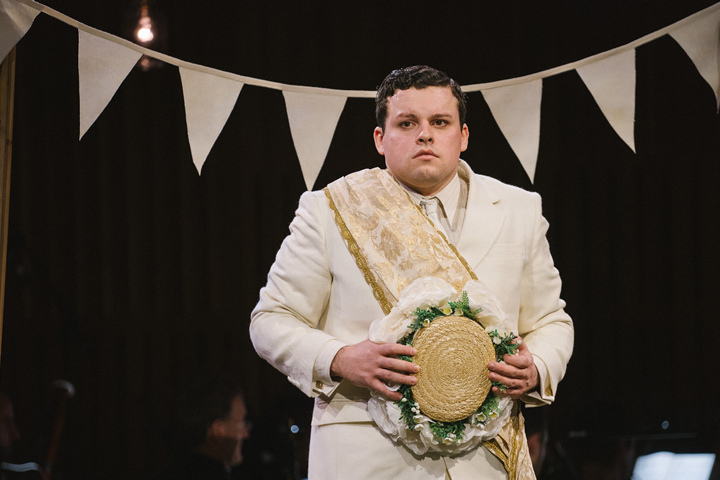| Opera Reviews | 28 April 2024 |
A charming production of Albert Herringby Catriona Graham |
|
Britten: Albert Herring |
|
 |
|
|
Albert Herring has to be amongst the most accessible of operas. Benjamin Britten’s tale of small town life, to Eric Crozier’s libretto, based on a short story by Guy de Maupassant, conjures up a cast of characters recognisable across the land. In Opera North’s revival of the Giles Havergal 2013 production, directed by Elaine Tyler-Hall, the audience is cast in the role of onlookers as the story plays out on a stage that is less ‘in the round’ than elliptical. The set comprises a series of ingenious wooden crates, which unfold to create greengrocer’s stalls or whose drawers contain the accoutrements of a counter. Lady Billows and her redoubtable housekeeper, Florence Pike, find a lack of virtue in every girl suggested by the committee of Mayor, Vicar, Schoolteacher and Police Superintendent for the May Queen of Loxford. What is to be done? The animated discussion amongst the committee members in a fugue is reflected in movement director Tim Claydon’s quasi-dance, as they interweave and circle around each other. Eventually, in an early example of diversity and gender-neutral casting, they decide to crown Albert Herring, son of the local greengrocer, May King. Judith Howarth is magnificent as Lady Billows, clearly a daughter of Lady Bracknell, and with a voice which could probably have deflected incoming doodlebugs. The badger stripe in her hair is such a nice detail. Heather Shipp is a sour-faced Florence Pike, her steely-grey hair in a tight bun, her voice conveying a stern disapproval of everything, really. Although Albert’s mother is well-pleased with her son’s honour, especially the monetary part of it – ‘Twenty-five quid!’ – Albert himself is less so. He is, however, aware that something is lacking in his life, not just because his friend Sid tells him so. Dominic Sedgwick is a rather spivvy Sid. His girlfriend Nancy (Katy Bray), whose presence discomfits Albert, is embroiled in Sid’s plot to release the inner Albert on the occasion of the coronation. Bray is a brisk and capable Nancy, well up to keeping her young man under control, when she wants. And so to the coronation and Albert’s big moment. Daffydd Jones takes diffidence to an entirely new level with his entrance in his May King outfit – white suit, golden sash, straw boater with the brim invisible below orange blossoms – and his inability to reply to the many ‘few words’ and gifts presented by the Committee with more than a ‘thank you’. His equilibrium, such as it is, is gained by quaffing Nancy’s lemonade liberally laced (or spiked, in modern parlance) with Sid’s rum. Unsurprising, then, that he goes off on a spree later than evening and Doesn’t Come Home. Albert being presumed dead allows the Committee more pompous pontificating. Amy Freston is a wonderful Miss Wordsworth, clearly keen on the Vicar (William Dazeley) and costume designer Leslie Travers provides her with a remarkably fine wardrobe, given rationing. Dazeley’s Mr Gedge comes of a long line of clergymen in British culture, and his earnest sermon about virtue is a joy. Mr Upfold, the Mayor, is played to perfection by Paul Nilon – the chains of office just so, the right level of obsequiousness balanced by pride in his position and town. Richard Mosley-Evans, as Superintendent Budd, gets one of Britten’s best musical jokes in the score – the throat-clearings as he starts to speak. Claire Pascoe is a proud mother, desolated by the loss of her son, but more distraught when he returns, alive and independent. Jones’ confident recitation of how he spent his absence appalls his auditors. Except, perhaps, Sid and Nancy – in the closing moments of the opera, Albert does ask them if he has laid it on too thick. Then there are the children, playing ball games in the street, practising the ‘coronation anthem’ with Miss Wordsworth but distracted by the spread prepared for the festivities, gleefully imagining gruesome outcomes for the missing Albert. The opera ends with Sid, Nancy and Albert playing with them, reminding us that these young people are not that much older than the children. Garry Walker conducts the small orchestra with aplomb, bringing out the range of sounds required by Britten’s score. This is a charming production, well worth braving wintry weather for. |
|
Photo © Tom Arber |
|







